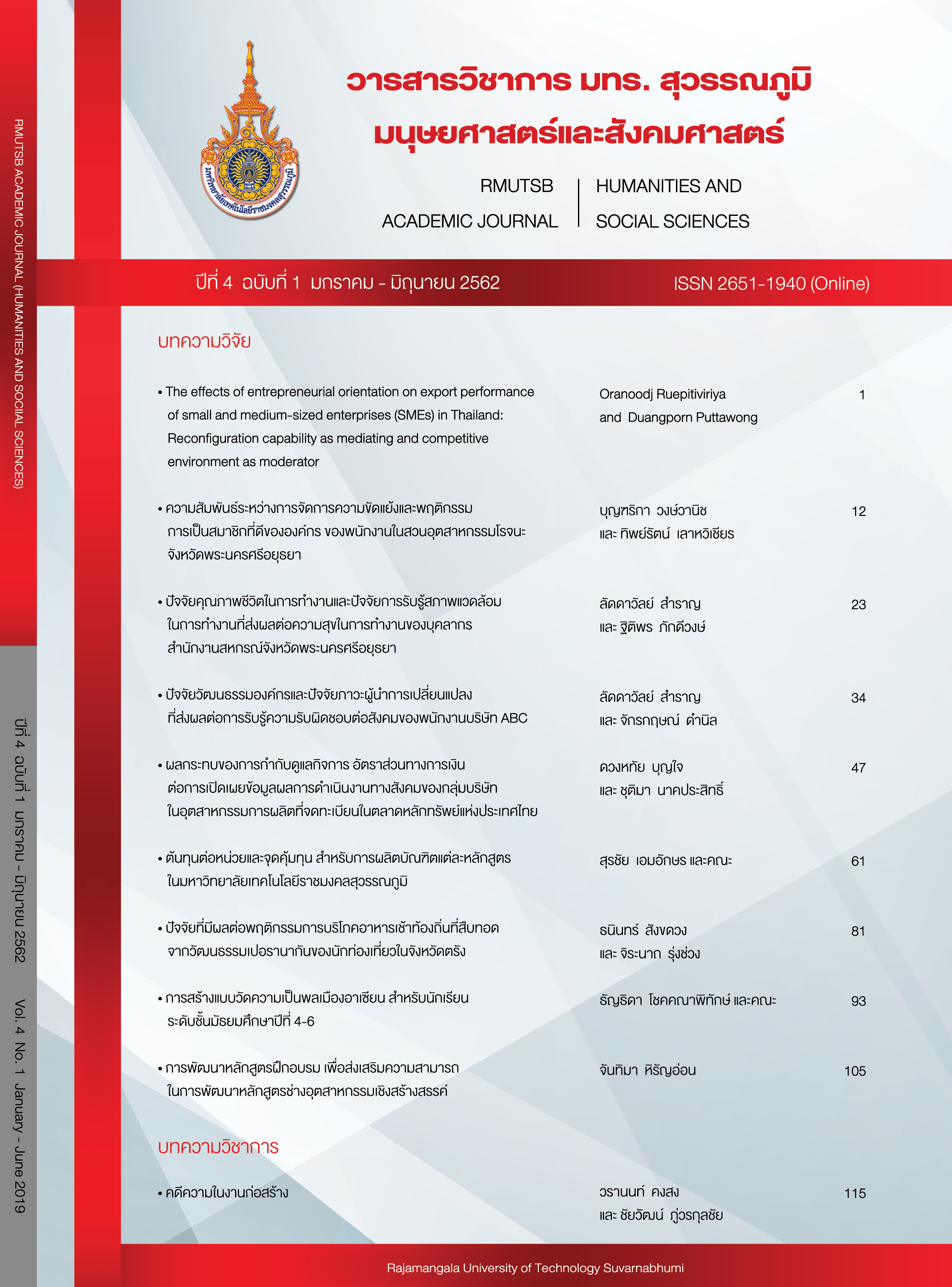The development of training curriculum to enhance ability in creative industrial engineering curriculum development
Main Article Content
Abstract
The objectives of this research were to develop the training curriculum to enhance ability in creative industrial engineering curriculum development and to evaluate the effectiveness of the training curriculum. The research was divided into two phases. Phase 1 was to develop the training curriculum, and phase 2 was to improve the training curriculum. The samples of the study were 13 third year students in second semester of the academic year 2017. Evaluation of training curriculum by five experts revealed that the training curriculum was highly suitable and effective. It contained 7 key elements, which consisted of 1) rationale principles, 2) curriculum objectives, 3) curriculum structures, 4) content structures, 5) training process, 6) duration of the training, and 7) training measurement and evaluation. The effectiveness evaluation of the training curriculum showed that 1) the post test mean score of knowledge in creative industrial engineering curriculum development of the trainees was significantly higher than the pretest at 0.05 level, 2) ability to develop creative industrial engineering curriculum was at very good level, and 3) the satisfaction of students toward training curriculum was at the highest level.
Article Details
References
ชาลินี เกสรพิกุล. (2556). การพัฒนาหลักสูตรฝึกอบรมเพื่อพัฒนาสมรรถนะครูภาษาไทยด้านการคิดวิเคราะห์. วารสารวิชาการ มหาวิทยาลัยอีสเทิร์นเอเซีย, 2(2), 200-208.
ชูชัย สมิทธิไกร. (2554). การฝึกอบรมบุคคลากรในองค์กร (พิมพ์ครั้งที่ 3). กรุงเทพฯ: โรงพิมพ์แห่งจุฬาลงกรณ์มหาวิทยาลัย.
เด่นพงษ์ พลละคร. (2551). การนำความรู้ทางทฤษฎีการบริหารบุคคลไปใช้ปฏิบัติ. ปทุมธานี: มหาวิทยาลัยรังสิต.
ทิศนา แขมมณี. (2555). ศาสตร์การสอน (พิมพ์ครั้งที่ 16). กรุงเทพฯ: ด่านสุทธาการพิมพ์.
พิจิตรา ทีสุกะ. (2556). การพัฒนาหลักสูตรฝึกอบรมนักศึกษาวิชาชีพครูเพื่อพัฒนาความสามารถในการจัดประสบการณ์สร้างเสริมการตระหนักรู้ในตนเอง สำหรับเด็กปฐมวัย. วารสารศึกษาศาสตร์ มหาวิทยาลัยศิลปากร, 7(1), 135-137.
วิจารณ์ พานิช. (2555). วิถีสร้างการเรียนรู้เพื่อศิษย์ในศตวรรษที่ 21. กรุงเทพฯ: มูลนิธสดศรี - สฤษดิ์วงศ์.
ศิริชัย กาญจนวาสี. (2544). ทฤษฎีการทดสอบแบบดั้งเดิม. กรุงเทพฯ: โรงพิมพ์แห่งจุฬาลงกรณ์มหาวิทยาลัย.
สาวิตรี สิทธิชัยกานต์. (2560). การพัฒนาหลักสูตรฝึกอบรมเสริมสร้างความสามารถในการจัดการเรียนรู้ บูรณาการธรรมชาติวิทยาศาสตร์ สำหรับครูระดับมัธยมศึกษา. วารสารมนุษย์สังคมศาสตร์ มหาวิทยาลัยศิลปากร, 10(2), 1076-1088.
สรญา วัชระสังกาศ. (2560). การพัฒนาหลักสูตรฝึกอบรมเพื่อส่งเสริมทักษะการคิดอย่างมีเหตุผลสำหรับนักเรียนชั้นประถมศึกษาปีที่ 3 สังกัดสานักงานเขตพื้นที่การศึกษาประถมศึกษาสกลนคร เขต 3. วารสารวิจัยและพัฒนา วไลยอลงกรณ์ในพระบรมราชูปถัมภ์, 12(1), 39-40.
Oliva, P. F. (2001). Developing the curriculum (7th ed). Boston: Allyn and Bacon.
Taba, H. (1962). Curriculum development: Theory and practice. New York: Harcourt, Brace & World, lnc.

